ADAMHS - Evaluation & Research Officer
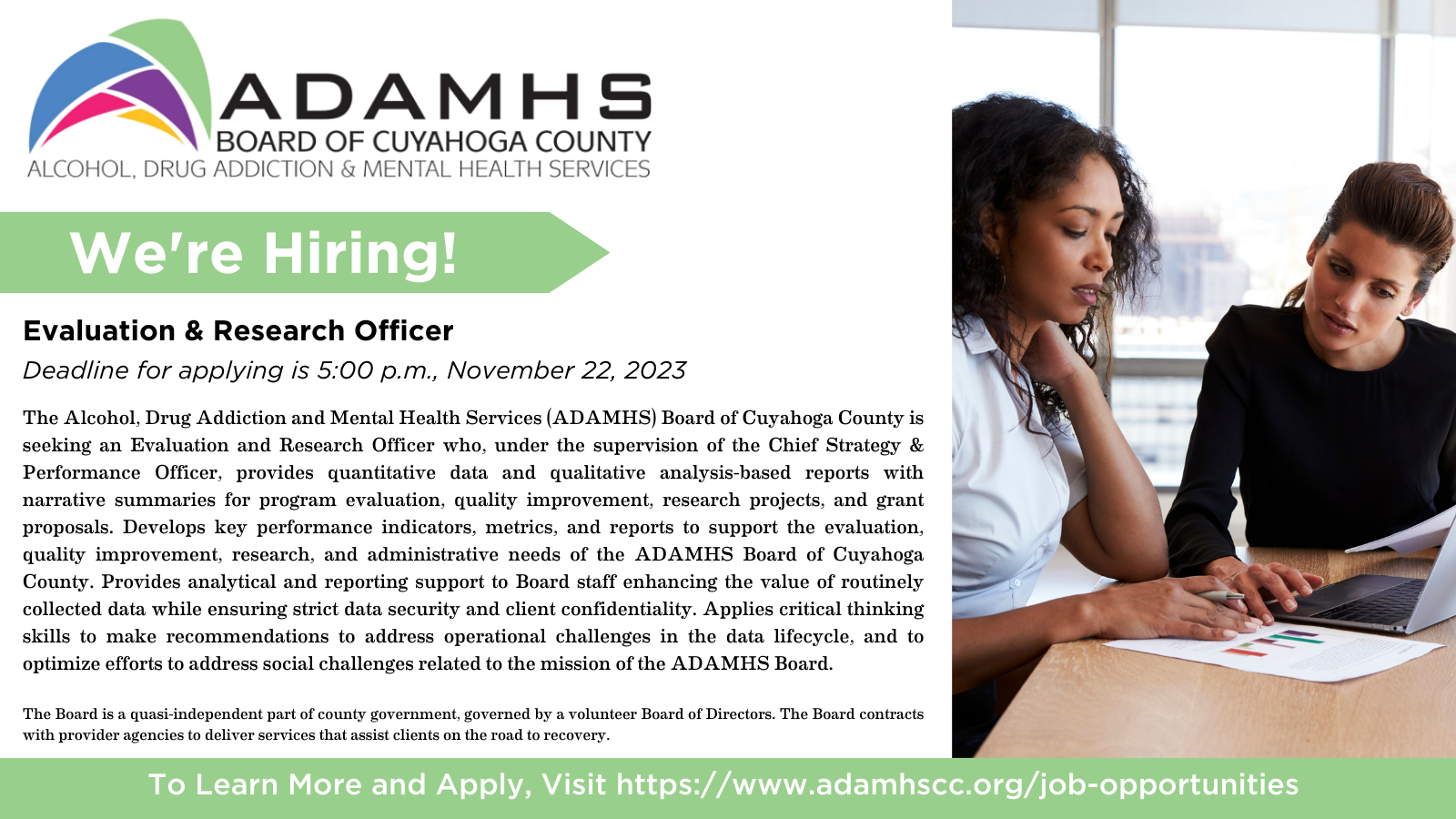
ADAMHS is hiring an Evaluation and Research Officer
The Alcohol, Drug Addiction and Mental Health Services (ADAMHS) Board of Cuyahoga County is seeking an Evaluation and Research Officer who, under the supervision of the Chief Strategy & Performance Officer, provides quantitative data and qualitative analysis-based reports with narrative summaries for program evaluation, quality improvement, research projects, and grant proposals. Develops key performance indicators, metrics, and reports to support the evaluation, quality improvement, research, and administrative needs of the ADAMHS Board of Cuyahoga County. Provides analytical and reporting support to Board staff enhancing the value of routinely collected data while ensuring strict data security and client confidentiality. Applies critical thinking skills to make recommendations to address operational challenges in the data lifecycle, and to optimize efforts to address social challenges related to the mission of the ADAMHS Board.
The Alcohol, Drug Addiction and Mental Health Services (ADAMHS) Board of Cuyahoga County is responsible for the planning, funding, and monitoring of public mental health and addiction treatment and recovery services delivered to the residents of Cuyahoga County. Under Ohio law, the ADAMHS Board is one of 50 Boards coordinating the public mental health and addiction treatment and recovery system in Ohio.
The Board is a quasi-independent part of county government, governed by a volunteer Board of Directors. The Board contracts with provider agencies to deliver services that assist clients on the road to recovery.
Global Cleveland Intern

Position: Global Cleveland Intern
Reports to Josephine Manco
Compensation: n/a
Schedule: Part-time, 12 – 20 hours a week
Length of time: minimum 2-month commitment
Location: Remotely – until further notice
Internship Opportunities:
Global Cleveland provides internships to students interested in the non-profit sector on a year-round basis. Interns will have a variety of opportunities including:
- Participate in the management of programs for newcomers by coordinating volunteer and client databases and updating program and participant contacts.
- Serve as a contact for inquiries about programs for newcomers and visitors.
- Assist in updating program materials such as brochures, newsletters, websites, manuals, and forms.
- Assist in developing partnerships with local community organizations and educational institutions.
- Research the development of program-related information.
- Assist the director of volunteer services with volunteer orientations, preparing documents, training support, and special events.
- Work with the development officer on fundraising activities including researching funding prospects and drafting letters and proposals.
Qualifications:
- Education: Current college student
- Experience: Experience in program coordination/management a plus
- Passion for Cleveland and Northeast Ohio
Required skills:
- Excellent writing, communication, and customer service skills.
- Delivers quality work product in a timely manner and meets deadlines.
- Proficiency in MS Word, Excel, spreadsheets, and databases.
- Understanding of management information systems: an online database and electronic filing system
- Ability to learn and utilize programs including, but not limited to Gmail, survey monkey, and Salesforce.
- General office skills, including typing, filing, answering telephones, scheduling, copying, scanning, etc.
- Effective organization skills, critical thinking, and ability to multi-task.
Desired skills:
- Interest in and knowledge of the nonprofit sector
- A great sense of humor
- Bilingual
How to Apply:
Email: [email protected] and mention the session you are applying for “Summer” or “Fall”.
GCP Internship Opportunities

- GCP Summer Internship Program Position Descriptions 2021
- GCP Summer Internship Program Guidelines & Application Requirements 2021
- GCP Summer Internship Program Applicant Form 2021
- GCP Employment Application Form 2021
- Background Check Applicant Release Form 2021Affirmative Action Form (Pre-Hire) 2021
Out of 100,000 Interviews, These 7 Candidate Questions Stood Out
Author: Sjoerd Gehring
“Do you have any questions for us?”
You’ll be asked it in almost any interview. And while you may be tempted to sit back and relax during this portion—while the recruiter’s put in the hot seat—that’s not actually in your best interest.
Why? Because this is your final chance to make an awesome impression.
My team and I interview around 100,000 people a year so, as you can imagine, we always take notice when someone asks a question besides “What’s a typical day like?” or “When will I hear back from you?”
In fact, you shouldn’t be afraid to grill hiring managers during this portion of the conversation. Chances are, they're hoping you will.
To help get you started, here are some of the super-smart questions I’ve been asked during actual interviews by real-life candidates–and the reasons they got my attention.
1. “Who Does the Wireframing for Your Site?”
OK, that’s clearly specific to a certain role. But I’m using this one as an example of a question you can ask that places you in the role you’ve applied for.
This question came from a prospective designer. We got talking about a new internal website we were developing and he asked, "Who does the wireframing for your website, the design team or a specific UX team?"
We ended up having a great discussion about our processes and how he could contribute to the development of the project. I remember thinking it was like we were already working together. And, from his perspective, he got a great insight into the way we work across teams and who has responsibility for what.
2. “Why Does This Role Matter to the Growth of the Company?”
Talk about putting the ball back in my court! This question showed me the candidate was interested in more than just what I thought of him then and there, in the interview. She wanted to make an impact beyond her own role or team and get a feel for how she’d fit into the future plans of the business.
And, from a candidate perspective, it’s a great way to help you see whether the role you’ve applied for will be a high or low-profile position. It also gives you an indication of what’s expected of the person who fills that role.
3. “Could I Meet Some of the People I’d Be Working With?”
I’ve been asked this a few times—especially more recently—and it’s a great question. (And one that we always try to accommodate.) It shows me the candidate understands the importance of cultural fit and team dynamics and that it matters to them. This is clearly not a person who wants to come to work, sit down at their desk every day, and work in a solitary bubble with their headphones on.
Plus, if you want to get a sense of whether you’ll enjoy being around the people you could be working with every day, this is the question you should ask.

4. “Why Has the Person in This Role Decided to Leave?” / “Who Had This Role Before?”
This can be a very revealing question! Why is the position you’ve applied for available? Is it because the previous person has been promoted or moved to a different team? Both of which would suggest that this job would set you up for progression.
Or, did the person leave to join another company? Or because they didn’t meet expectations? If the recruiter hesitates or becomes evasive, that could tell you everything you need to know! Equally, stay alert and if you sense it’s time to move the conversation on, gently change the subject to something else or ask a new question that’s easier to answer.
5. “What Do You Like Most About Working Here?”
I’ve only been asked this once, believe it or not. It was by a candidate who’d just finished giving a very competent response to the question, “Why do you want to work here?”
I loved the way she tossed this question right back at me. And, although it took me a few seconds to think how to respond, we ended up having a great conversation about how rewarding a career at J&J can be, both personally and professionally.
As a candidate, it’s the perfect question to catch the recruiter a little off-guard and get an honest answer. Regardless of what they say, you can probably gauge how they truly feel about their company, which gives you another indication of whether it’s the right fit for you.
6. “Do You Have Any Reservations About Me or My Qualifications?”
A seriously gutsy question! So gutsy that I was impressed by the confidence of the candidate who asked it. You might think you’re setting your self-esteem up for a knocking. But it’s actually very smart.
A question like this gives you the chance to address any concerns the recruiter may have about your fit for the role head-on, in person. In the instance I’m thinking of, the candidate was actually able to mitigate the concerns I had about a large, unexplained gap on his resume. It transpired he’d taken an unpaid sabbatical to care for his infant daughter while his wife went back to college.
Sure, it takes some gumption to ask. But why allow a potentially unfounded reservation turn into a reason to give someone else the job ahead of you?

7. “How Do You Deal With Professional Disagreements Within the Team? Can You Give Me an Example?”
Another question that shows a recruiter that they’re talking to a candidate who cares about team dynamics and understands that how a team works together can make or break the success of its projects.
For you as a candidate, it’s an incredibly useful way to find out whether you’ll be joining a team of ‘yes-men’ or whether respectful (emphasis on respectful!) disagreements are encouraged to ensure all avenues are explored and that company goals are put ahead of egos. Providing the interviewer answers honestly, it also gives you an indication of inter-team dynamics.
As a recruiter, I’ve heard a lot of awesome questions (such as these)—and some I bet the candidate regretted instantly! But, with a little preparation, there’s no need to feel anxious about this part of an interview.
The hiring manager knows you want to figure out if the role is right for you so they’ll be expecting questions. And by taking a couple of the examples above and modifying them to fit your own situation, I can almost guarantee you’re going to instigate some really valuable discussions that help you (both!) to make the right decision about the role.
Photo credit: interview courtesy of Jessica Peterson/Getty Images.
To read the original article, click here.
The 3 Kinds of LinkedIn Messages That Are Unlikely to Get a Response
Author: Emily Liou
As a career coach, my inbox is often flooded with messages from people I’m connected with on LinkedIn who are reaching out about something or another. Now, I don’t mean to be judgmental, but I often find myself sighing with annoyance when I open them up—so much so that I was motivated to write this article.
You see, the thing is, I’m open to making new connections and willing to talk to anyone, so the fact that I often put off responding to messages means people are missing the mark. And that stinks because it takes effort to both find people to connect with in the first place and then cultivate a networking relationship from there.
I want to be excited when I read your message and I know you want that, too (or at least I hope you do!). Often times, it only takes a few tweaks to your words or tone to make that possible.
Below are messages inspired by real ones I’ve received along with my thoughts on why they’re not the best approach.
Quick note though: Unless you have LinkedIn Premium, you’ll need to connect before you send a message. But that doesn’t mean you can just send the generic invite. Instead, send a customized one with with these short templates so they’ll accept your request and you’ll be able to actually send over a note.
1. The Empty Query
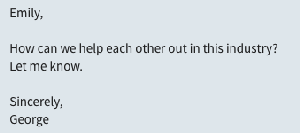
Initial Reaction
It’s nice that you want to find a way to help one another out, but this message doesn’t give me anything to work with. Perhaps there’s something in my my background that led you to reach out in this manner?
Revised

Why This Is Better
Anyone can spot a generic, non-customized message from three Wi-Fi zones away, and if you care about standing out, you’ll be careful not to be labeled as generic, right? The updated version attempts to start building a rapport. By including a customized, targeted line, I can tell George has looked into my background and is excited about finding a way to potentially work together. And that makes me much more inclined to respond to this.
2. The Vague Ask
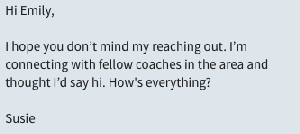
Initial Reaction
How’s everything? Hm, that’s a rather large question for someone I don’t know in real life. In fact, I’m not sure I’d even know where to begin in responding to this person.
The Revised Message

Why This Is Better
Being clear up front is just good business. It sets clear intentions and demonstrates professionalism. Many people have experienced accepting a meeting only to find it turn into a sales pitch. If you’re clear about the reason why you’re reaching out, you’re going to build a higher level of trust out the gate and find people who are attracted to your proposal. This is what building a network is all about.
3. The Forceful Demand
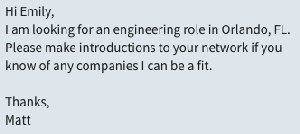
Initial Reaction
Hi Matt. My current profile has been updated to indicate that I’m no longer a recruiter (not to mention I definitely don’t specialize in the Florida market as I’m in Los Angeles). If you’re going to spend the time, energy, and effort in sending messages and attempting to foster relationships, it’s far more more effective if you target the correct audience.
The Revised Message
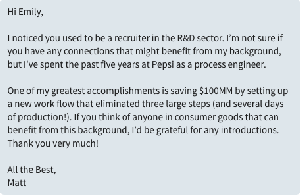
Why This Is Better
If you’re actively seeking a new position and are wanting to connect, it makes a huge difference if you can share in a couple of sentences what you’re looking for and a glimpse of what you bring to the table. Even though I’m no longer entrenched in the recruiting world, I’m still well-connected.
If Matt had demonstrated clear professionalism in a straightforward introduction, and made note of target roles he’s seeking, I’d for sure be inclined to point him to resources or ask him for his resume to pass along.
The thing to remember is that if you’re asking one of your LinkedIn contacts for something, you need to make it as easy as possible for that person to follow up.
It may be difficult to see it, but every piece of correspondence counts—from the way you first connect to how you stay connected. Don’t randomly reach out to 20 of your LI connections for the sake of hoping something falls into place in your job search. By building off of the revised templates above, you’ll be able to initiate conversations that result in meaningful networking relationships.
Photo credit: wernerimages/Getty Images.
To read the original article, click here.
Interview Translation: What 4 Common Questions Really Mean
Author: Sara Mccord
Acing the interview isn’t just about having the perfect canned speeches. Yes, you need to show off your experience, talents, and personality—but before answering each question, you also have to figure out what the interviewer is actually asking you.
Those seemingly innocuous questions, like “tell me about yourself” and “where do you see yourself in a few years?” aren’t just get-to-know-you conversation starters. They’re one of the key ways an interviewer will seek to uncover whether you’re the right fit for the job.
So, before you start to share your life story—or recite the same answer you gave at the last interview—it’s important to figure out what the interviewer really wants to know. Check out our guide to translating interviewer-speak, and learn how to plot your answers accordingly.
1. Question: Tell me about yourself.
Translation: Tell me why you’re the right fit for this job.
The interviewer already has your resume and cover letter, so she’s not looking for a rundown of your employment history. Nor does she care that you grew up in Boston and love to jog on the weekends. She’s looking for a pitch—one that’s concise, compelling, and keeps her attention, and one that tells her exactly why you’re the right fit for the job.
So, while this is a good time to paint a broad picture of who you are, it’s most important that you include a couple of key facts that will sell you as the right candidate.
Think about the 2-3 specific accomplishments or experiences that you most want the interviewer to know about, and share them here. You can frame your stories or tie them together using a theme or a quote, if appropriate, such as “My first boss told me that fundraising is really building relationships, and that’s the approach I’ve taken throughout my career. For example…”
It’s also a good idea to practice your answer aloud, record it, then listen to your pitch. Are you engaging? Are you rambling? Are you getting your most important points across loud and clear? (This is good advice for any interview question.)
2. Question: How would you explain our organization’s mission?
Translation: Can you be an ambassador for our organization?
Any candidate can read and regurgitate the company’s “About” page. So, when an interviewer asks you this, she isn’t necessarily trying to gauge whether you understand the mission—she wants to know whether you care about it, and she’s looking for who in the applicant pool can most effectively discuss the organization’s work and its impact.
So, in addition to doing your research on the company’s work, think about concrete ways it relates to your passions and experiences, and weave them into your answer.
Start with one line that shows you understand the mission, using a couple key words and phrases from the website, but then go on to make it personal. Say, “I’m personally drawn to this mission because…” or “I really believe in this approach because…” and share a personal example or two. For example, if you’re interviewing at a school that stresses character, share some specific character-building education activities you’ve led for students in your last job. If you’re interviewing for a position at a hospital, talk about the 5K you recently ran to raise money for leukemia or your passion for volunteering your time to help children with cancer.
3. Question: Where do you see yourself in five years?
Translation: Do you care about our work?
Hiring someone is an investment, and interviewers believe (as you would expect) that someone genuinely interested in the organization’s work will be the better hire. So, what she really wants to know is whether this particular job and company is part of your career path, or whether you’ll be jumping ship in a year once you land your “real” dream job.
So how should you answer? If the position you’re interviewing for is on the track to your goals, share that, plus give some specifics. For example, if you’re interviewing for an account executive position an advertising firm, and you know your goal is to become an account supervisor, say that. And then add specifics about the sort of clients you hope to work with, which will help your answer sound genuine, not canned—and again show why this particular company will be a good fit.
If the position isn’t necessarily a one-way ticket to your aspirations, the best approach is to be genuine, but to follow your answer up by connecting the dots between the specific duties in this role and your future goals. It’s OK to say that you’re not quite sure what the future holds, but that you see this experience playing an important role in helping you make that decision, or that you’re excited about the management or communications skills you’ll gain.
4. Question: Do you have any questions for us?
Translation: Have you really been listening?
It’s easy to go into an interview with a list of questions about the position. But the tougher part—and what the interviewer really wants to see—is whether you can roll with the punches, engage in the conversation, and ask questions that weren’t already answered over the course of the interview.
This will require some thinking on your feet. As you’re going along in the interview, be thinking which key areas—job duties, company culture, the team you’ll be working with—haven’t been covered yet, so you can target your questions there. You can also prepare ahead of time by thinking of more non-traditional questions, or ask questions targeted to the interviewer herself, which probably won’t be covered in the interview.
Try things like: What you like most about working here? What drew you to work for this organization? What do you think are the current strategic challenges facing the organization? What advice would you give to someone in this role?
Remember, there’s no “right” answer to an interview question—or at least not one that’s right for every job. But by thinking about what an interviewer is really after, you can go a long way in showing her why you’re right for the job.
To read the original article, click here.
How to Ace a Lunch Interview
Author: Kate Farrar
Preparing for an interview is nerve-wracking enough, let alone when your potential employer suggests it over a meal. What should you order? How will the conversation go? And how can you highlight your strengths and accomplishments while trying to maneuver a mouthful of chicken Piccata?
When I interviewed for my current position, I had two lunch interviews. I was a first-timer at this interview format and had little knowledge of what to expect. But I survived—and so can you. Here are a few things I’d encourage if you find yourself in my same position.
How to Prepare
Do some basic research on the restaurant in order to figure out the location, menu, clientele, and noise level. Even if you’ve been to the restaurant before, take some time to review the menu and pick out a few options you might order. It’ll reduce the amount of time you spend looking at entrée options (time that could be spent engaging your future employer!).
Next, remember that one of the hardest things about an interview over a meal is that you can’t have notes available to refer to—at least not easily, anyway. So, you’ll want to spend plenty of time beforehand outlining the key points that you want to get across and and asking questions that you need answers to.
Finally, dress the part. Though a restaurant might feel more casual than a conference room, you still want to wear interview-appropriate business attire
When to Get There
Plan to arrive 15 minutes prior to the reservation and wait for your interviewers at the front of the restaurant—this will prevent the whole, “I wonder if they have a table yet?” awkwardness. (If you haven’t met them before, do a quick Google image search so you have some idea of who you’re looking for.)
What to Order (and Not Order!)
One of the trickiest things about the lunch interview is figuring out what to order. The best thing you can do is take the lead from your interviewers. When you sit down, casually ask if they’ve been to the restaurant before and what they think are good options—hopefully their recommendations will give you a sense of an appropriate price range. If not, when the wait staff arrives, try to have your interviewer order first and choose something at that price point (or less).
Also, be sure to pick an option that will be easy to eat while you’re talking. (Hint: Forkfuls of Caesar salad are easier to maneuver than a massive, messy sandwich.)
Finally, no matter how casual your employer may be, you want to put forward your very, very best self. This means: Stay away from ordering alcohol, even if the interviewers do. If you get the job, you will have plenty of opportunities to share a drink with them—the interview is not the time or place to start.
How to Present Yourself
An interview spent sharing a meal with your potential employers is typically more of a conversation than a Q & A format. So, don't be afraid to engage in a two-way dialogue. Yes, answer questions they ask you, but also insert any questions you have where appropriate, and know that it’s OK if the conversation veers into more personal topics (e.g., “Where did you grow up?”).
That said, follow your interviewers’ lead and listen closely for when they switch from casual dialogue to questions about your fit for the position.
Also remember that one reason for having an interview over a meal is that the employer is looking at how you present yourself in this setting (and how you would represent the company in future social settings). So, be aware of all those table manners: Sit up straight, keep your elbows off the table, maintain good eye contact, and don’t forget to say “please” and “thank you.”
How to Wrap Things Up
At the end of the meal, don’t be worried about the check. The interviewers have invited you to the meal, and therefore, they’ll pick up the tab.
As the bill is being paid, make sure to ask about any next steps, which will help guide what you write in your thank-you note (yep, you need to write one after every interview—meals included!). And also take the time to genuinely thank your interviewers for their time and the meal, both as they are paying the check and as you leave the restaurant.
Having a lunch interview is a good thing—it means the interviewers are interested in spending more time with you, and it’s a great way to convey your skills and personality in a less formal environment. Be prepared and remember these guidelines, and you’ll have a great coneversatio (maybe even a great meal as well).
Photo credit: Photo of interview over lunch courtesy of Maskot/Getty Images.
To read the original article, click here.
10 Types of Interviews (and How to Ace Them)
Author: the Daily Muse Editor
Interviews come in all shapes and sizes: Sometimes you’re with one interviewer, others you’re with five. Maybe you’ll be asked to lunch, expected to solve a problem, or invited to a Skype interview.
But no matter what the format, we’ll give you what you need to succeed.
We’ll show you how to nail every type of job interview you might face. Check out these 10 common interviews and what you need to know about them.
1. The Traditional Interview
This is the scenario you’ll face most often: You sit down with a solo interviewer and answer a series of questions designed to help her figure out if you’re a great candidate for the job.
What You Need to Know
- 51 Interview Questions You Should Be Asking
- How to Answer the 31 Most Common Interview Questions
- Your All-in-One Interview Prep Guide
2. The Phone Interview
Asked for a phone interview? A call is typically a first-round screening to see if you’re a fit to come in for a full interview, so nailing it is key. You’ll want to prepare just as you would for an in-person interview, with some key adjustments for the phone format.
What You Need to Know
- Got a Phone Interview? Make it Awesome, Not Awkward
- The 3 Questions Recruiters Expect You to Answer During a Phone Interview
- 4 Ways to Rock the Intro Call With a Recruiter
3. The Skype Interview
Skype video interviews take the phone-screening interview to the next level, and they’re becoming a regular part of the job application process for many companies. From choosing the right on-screen look to making sure all of your tech systems are a go, you’ll want to be 100% ready for your TV debut.
What You Need to Know
- Skype Hype: The Key to Acing Your Virtual Interview
- Phone and Skype Interviews Are the Worst, Unless You’re Prepared Like This
- How to Do a Video Meeting or Skype Interview Without Feeling Totally Awkward
4. The Case Interview
The case interview is a more specialized format in which you’re given a business problem (“How can BigCoal Co. double its growth?”) or a puzzle (“How many tennis balls fit in a 747?”) to solve. While case interviews were once exclusively the domain of aspiring consultants, they’re now popping up everywhere from tech companies to NGOs.
What You Need to Know
- Ace the Case: 7 Steps to Cracking Your Consulting Interview
- Secrets for Cracking the Quant Interview
- A Few Signs You’ve Taken Your Interview Research Too Far and Turned Into a Stalker
5. The Puzzle Interview
Google and other highly competitive companies have been known to ask “puzzle” questions, like, “How many people are using Facebook in San Francisco at 2:30 PM on a Friday?” Seems random, but your interviewer wants to determine how quickly you can think on your feet, how you’ll approach a difficult situation, and how you can make progress in the face of a challenge.
What You Need to Know
- 4 Insanely Tough Interview Questions (and How to Nail Them)
- 13 Crazy Interview Questions That Awesome Companies Will Actually Ask You
- 9 Steps to Solving an Impossible Brain Teaser in a Tech Interview (Without Breaking a Sweat)
6. The Lunch Interview
Has your potential employer suggested an interview over a meal? That’s a good sign—it usually means she wants to learn a little more about you and how you act outside of the office. We’ll show how to highlight your strengths and accomplishments while trying to maneuver a mouthful of chicken Piccata.
What You Need to Know
- Let’s Do Lunch: How to Prepare for a Job Interview Over a Meal
- 8 Rules You Should Memorize Before You Go on Any Interview That Involves Food
- The Only Advice You Need for Navigating an Interview Happy Hour (Because Yes, That’s a Thing)
7. The Group Interview
Group interviews aren’t common, but you might find them for sales roles, internships, or other positions in which the company is hiring multiple people for the same job. How do you catch the hiring manager’s eye when you’re part of the group? It takes a little gusto and a few smart tactics.
What You Need to Know
- Standing Out From the Crowd: How to Nail a Group Interview
- 16 Quick Tips That’ll Help You Stand Out in a Group Interview
- Here’s One Way to Stand Out When You’re Competing Against Hundreds of Qualified Candidates
8. The Working Interview
In some industries—writing, engineering, or even sales—you may be asked to complete an actual job task as part of the interview. Basically, your interviewers don’t want you to tell them you can do the job, they want to see it.
Don’t panic: If you go in prepared, this is your chance to shine.
What You Need to Know
- The Best Interview Questions to Ask in Every Round
- Is It Normal to Get a Job Interview Assignment?
- What Every Job Seeker Should Know About Work Assignments During the Interview Process
9. The Firing Squad
If you’ll be reporting to several people or working with a team, it’s not uncommon to meet with multiple interviewers—all at the same time. Sounds nice, because you only have to answer those tough questions once, but it can also be tricky to make a strong connection with each decision maker.
What You Need to Know
- The Firing Squad: How to Survive a Panel Interview
- The Secret Weapon That Job Seekers Always Ignore When Prepping for an Interview
- 6 Questions That Will Ease Your Mind Before the Interview
10. The Career Fair Interview
If you’re attending career fairs as part of your job hunt, get ready for impromptu interviews, where you’ll only have 10 or 15 minutes to sell yourself to the recruiter for a chance to come in for a full interview.
What You Need to Know
- 4 Job Fair Tips That’ll Make the Experience Worthwhile
- 8 Easy Ways to Become the Most Confident Person in the Room
- 4 Mindset Changes That’ll Make Networking Feel Way Less Fake and Horrible
Photo of job interview courtesy of Shutterstock.
To read the original article, click here.
3 Steps to a Perfect Informational Interview
Author: Lily Zhang
Let’s say you managed the tricky process of asking for an informational interview (and yes, we've got tips for that, too ) and have succeeded in arranging a meeting with an amazing contact.
What now? How do you make the most of this conversation—while still keeping things casual and comfortable?
As always, it’s just a matter of being prepared. Here’s a three-part process for your next meeting that’ll make sure you get the advice you need and make a great impression .
1. Warm Up
People love to talk about themselves, so when you first sit down, let them! Get the conversation going by asking your contact something about his or her experiences thus far—something he or she knows all about. Some good places to begin:
- How did you get your start in this field?
- What’s it like working at your company?
- What projects are you working on right now?
- What’s your opinion on [exciting development in the industry]?
You should also be prepared to chat about yourself, your past experiences, and your career goals. Remember, this meeting isn’t just a time to ask for advice and learn from your contact’s experiences—it’s also a chance to make an impression. For example, don’t be afraid to preface your questions with what you already know. Something like, “It looks like recent developments in the field of nuclear fission are going to be pretty disruptive to the energy industry. How do you think this will affect your company?”
2. Get What You Want
After you’ve made some general conversation, it’s time to move on to what you came for : the advice you can’t get anywhere else.
Before the meeting, think through the insider information you want to learn from this person. What information are you seeking? Is there something you can learn from this person that would be difficult for you to learn on your own? Depending on where you are in the job search process, adjust your questions accordingly.
For example, if you’re still in exploration mode, trying to find out if, say, working for an educational technology startup is for you, then ask questions like:
- How did you choose this company or position over others in your field?
- What is the most rewarding thing about working in this industry? The most challenging?
- My background is in urban planning—how do you think I can best leverage my previous experience for this field?
If you’re further along in your job search and could use some job hunting and interviewing tips for specific companies, don’t be afraid to ask questions like:
- I’m waiting to hear back about interviews for positions—what advice would you give me about how to best prepare?
- What experiences, skills, or personality traits does your company look for in new hires?
- What do you wish you had done differently when you first started at your company?
- What job search advice would you give to someone in my situation?
Of course, you’ll want go with the flow of the conversation —you’re trying to build a relationship, not fire off as many questions as you can. Also remember that what these questions have in common is that they are all seeking advice. Keep it that way. It’s no mystery that you are clearly looking for a new position or career change, and the fastest way to alienate your contact is to ask for a job (or anything along those lines). If your contact offers to forward your resume based on your conversation, then by all means, take advantage of it. But that process is for him or her to initiate, not you.
3. Tap Into Their Network
That said, as you’re wrapping up the meeting, you should ask for recommendations for two or three more people who would be good to talk to as you continue networking. The likelihood someone will take time to chat with you goes up significantly if your initial request comes through a mutual contact, so it’s a fast, easy way to talk to even more people.
The key here is to make your request as specific as possible. This might be counterintuitive, but it actually makes it easier for your contact to think of someone when you say, “Could you recommend a couple more people for me to speak with to learn more about exit opportunities after a career in consulting ?” than to come up with an answer to, “Is there anyone else you would recommend that I speak with?”
To recap: Get the conversation going, know what you want to get out of the meeting, and don’t leave without knowing who you’re contacting next. And don’t forget to follow up with a thank-you note! Better yet, follow up again with an update on your meetings with the people he or she recommended and the results of your job search. After all, your informational interviewees aren’t just useful for their one-time advice—they can become a long-term part of your network.
Photo of informational interview courtesy of Shutterstock .
To read the original article, click here.








